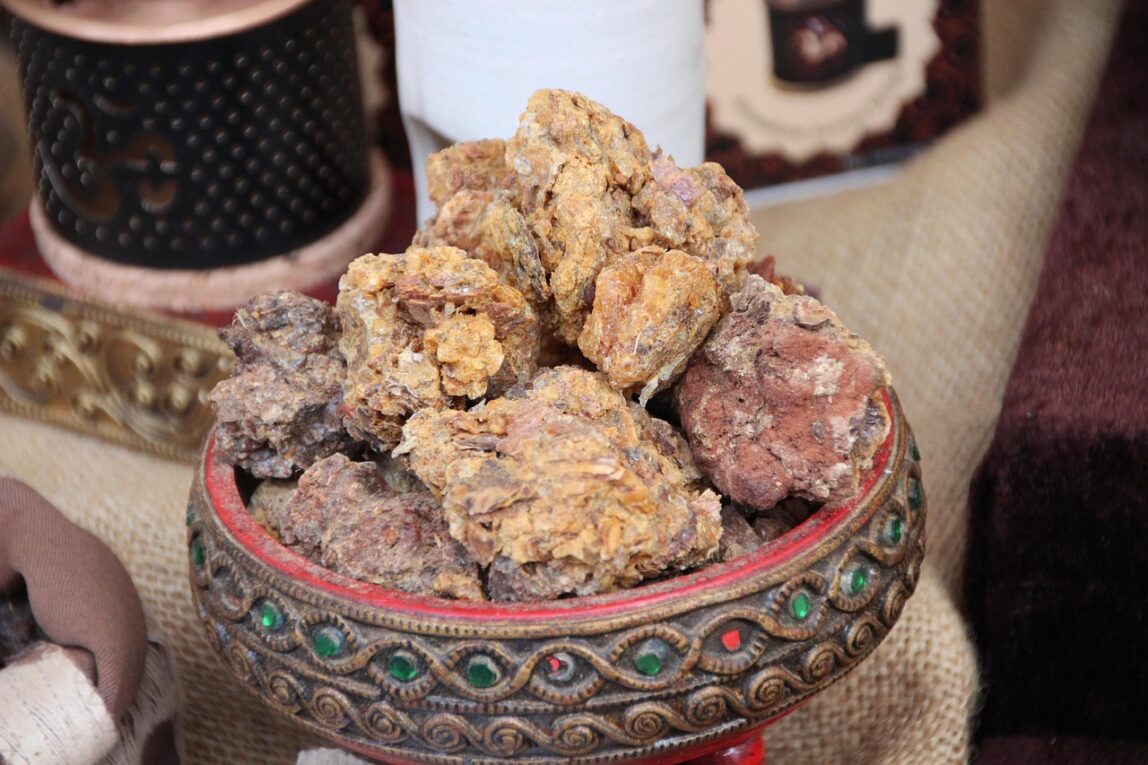Myrrh is a reddish-brown resin derived from the dried sap of the Commiphora myrrha tree, native to northeast Africa and the Arabian Peninsula. Known for its bitter aroma and ancient symbolism, myrrh has been prized for over 4,000 years in religious rituals, traditional medicine, embalming and perfumery.
The name “myrrh” comes from the Arabic word murr, meaning bitter—aptly describing both its taste and scent.
Health Benefits of Myrrh
Myrrh is a powerful herbal ally with a rich history, potent healing qualities, and spiritual resonance. While modern research is catching up to its traditional uses, it remains a respected botanical for immune support, wound healing, oral care and emotional balance. Used wisely, it brings both ancient wisdom and modern efficacy into your wellness routine
Below we will explore the health benefits of Myrrh in more detail:
Powerful Antimicrobial Properties of Myrrh
Myrrh is known for its potent antibacterial and antifungal activity. It’s especially effective when used topically for wounds, ulcers and infections. Myrrh oil or tincture has been traditionally used as a natural antiseptic for oral health, helping treat mouth ulcers, gingivitis and sore throats.
Lesser-known fact: Studies show that myrrh’s effectiveness is significantly enhanced when combined with frankincense, producing a synergistic antimicrobial effect against Staphylococcus aureus and Candida albicans.
Myrrh is an Oral Health Hero
Myrrh is widely used in natural toothpaste, mouthwashes and gum tonics. It helps reduce oral inflammation, strengthen gums and combat bad breath due to its astringent and antimicrobial qualities. Traditional Chinese Medicine even considers it a remedy for “tooth worms.”
“Tooth worms” are a historical myth once widely believed to be the cause of toothaches and dental decay. The concept dates back thousands of years and was accepted in many cultures, including ancient Mesopotamia, China, India and Europe. Modern science has proven that tooth decay is caused by bacteria (not worms), primarily Streptococcus mutans, which produce acid as they feed on sugars. This acid erodes tooth enamel and creates cavities.
Anti-Inflammatory & Analgesic Effects of Myrrh
Myrrh contains sesquiterpenes and furanodienes, compounds that have been shown to reduce pain and inflammation in conditions like arthritis. It has a long history of use as a natural pain reliever for muscular pain, menstrual cramps and general discomfort.
Fun fact: The ancient Greeks used a myrrh-infused wine known as myrrhina for both pain relief and embalming.
Myrrh for Circulation and Detoxification
In traditional Ayurvedic and Chinese medicine, myrrh is considered a blood mover, helping improve circulation, relieve stagnation and support detoxification, especially of the liver and reproductive organs. It’s often used to ease delayed or painful menstruation.
Antioxidant & Anti-Cancer Potential of Myrrh
Myrrh is a rich source of terpenoids and polyphenols, which act as antioxidants. Emerging research suggests that myrrh extracts may help induce apoptosis (cell death) in certain cancer cells, particularly in prostate, breast and colorectal lines. However, this is still in early experimental stages.
Traditional and Spiritual Uses of Myrrh
Myrrh was often burned as incense to purify temples and homes. Its warm, grounding scent is still valued in aromatherapy for easing grief, sadness and emotional trauma.
- Egyptians used myrrh in embalming mixtures and temple incense.
- Biblical texts mention it as one of the gifts of the Magi and as part of anointing oils.
- In Traditional Chinese Medicine, myrrh (mo yao) is used to promote circulation and heal wounds.
How to Use Myrrh
- Myrrh tincture (alcohol extract): diluted for gargles or topical use.
- Essential oil: used in diffusers, massage blends or diluted for skin application.
- Powdered resin: included in herbal capsules or homemade toothpaste.
- Incense or resin burners: for ceremonial or meditative use.
| Need Personal Advice? Book a private consultation with me, Cath Davis (Master Herbalist) and get expert advice and a plan that works for your body – no guesswork needed. |
Always take care when taking herbs and Read Our Disclaimer.
Myrrh Notes / Side Effects
Myrrh Safety and Cautions
- Pregnancy and breastfeeding: Myrrh can stimulate uterine contractions and should be avoided.
- Overuse risks: High doses (especially of the resin or oil) may cause diarrhoea, nausea or kidney irritation.
- Skin sensitivity: Myrrh oil can be a skin irritant if not properly diluted.
- Drug interactions: May affect blood sugar levels and interfere with anticoagulant or antidiabetic medications.
Rare but Notable Reactions of Myrrh
- Some people may experience contact dermatitis or allergic reactions from topical use.
- In high doses, myrrh can paradoxically cause increased heart rate and lower blood pressure, making it unsuitable for people with heart conditions unless used under supervision.
Keep Exploring…
Curious what other natural remedies can do? Explore the full A–Z of our Natural Healing articles.

